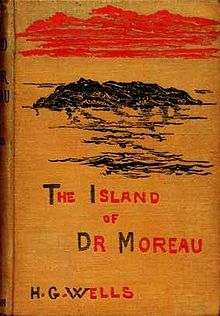
Back جزيرة الدكتور مورو Arabic Doktor Moronun adası Azerbaijani Островът на доктор Моро Bulgarian L'illa del doctor Moreau Catalan Ostrov doktora Moreaua Czech Die Insel des Dr. Moreau German La isla del doctor Moreau Spanish Moreau Doktorearen Uhartea Basque جزیره دکتر مورو Persian Tohtori Moreaun saari Finnish
 First edition cover (UK) | |
| Author | H. G. Wells |
|---|---|
| Genre | Science fiction |
| Published | January 1, 1896 (Heinemann (UK); Stone & Kimball (US)[1]) |
| Publication place | United Kingdom |
| Text | The Island of Doctor Moreau at Wikisource |
The Island of Doctor Moreau is an 1896 science fiction novel by English author H. G. Wells. It was published on 1 January 1896. The novel is set between 21 January 1887 to 5 January 1888. The text of the novel is the narration of Edward Prendick, a shipwrecked man rescued by a passing boat. He is left on the island home of Doctor Moreau, a mad scientist who creates human-like hybrid beings from animals via vivisection. The novel deals with a number of themes, including pain and cruelty, moral responsibility, human identity, human interference with nature, and the effects of trauma.[2] Wells described it as "an exercise in youthful blasphemy."[3]
The Island of Doctor Moreau is a classic work of early science fiction[4] and remains one of Wells's best-known books. The novel is the earliest depiction of the science fiction motif "uplift" in which a more advanced race intervenes in the evolution of an animal species to bring the latter to a higher level of intelligence.[5] It has been adapted to film and other media on many occasions.[6]
- ^ "HGWells".
- ^ Barnes & Noble. "The Island of Doctor Moreau: Original and Unabridged". Barnes & Noble.
- ^ Wells's description of The Island of Dr. Moreau as youthful blasphemy comes from his introduction to The Scientific Romances of H. G. Wells (1933; published in the United States as Seven Famous Novels by H. G. Wells, 1934). This Preface to the Scientific Romances is reprinted as a chapter of editors Patrick Parrinder and Robert M. Philmus's H. G. Wells's Literary Criticism (Sussex: The Harvester Press Limited, and New Jersey: Barnes & Noble Books, 1980), see p. 243 for the line quoted.
- ^ See Mason Harris's introduction and notes for the 2009 Broadview Books edition of The Island of Dr. Moreau
- ^ Booker, Keith M. (2014). Historical Dictionary of Science Fiction in Literature. Rowman & Littlefield. p. 311.
- ^ "How Hollywood fell for a British visionary". The Telegraph. Archived from the original on 12 January 2022. Retrieved 14 March 2019.